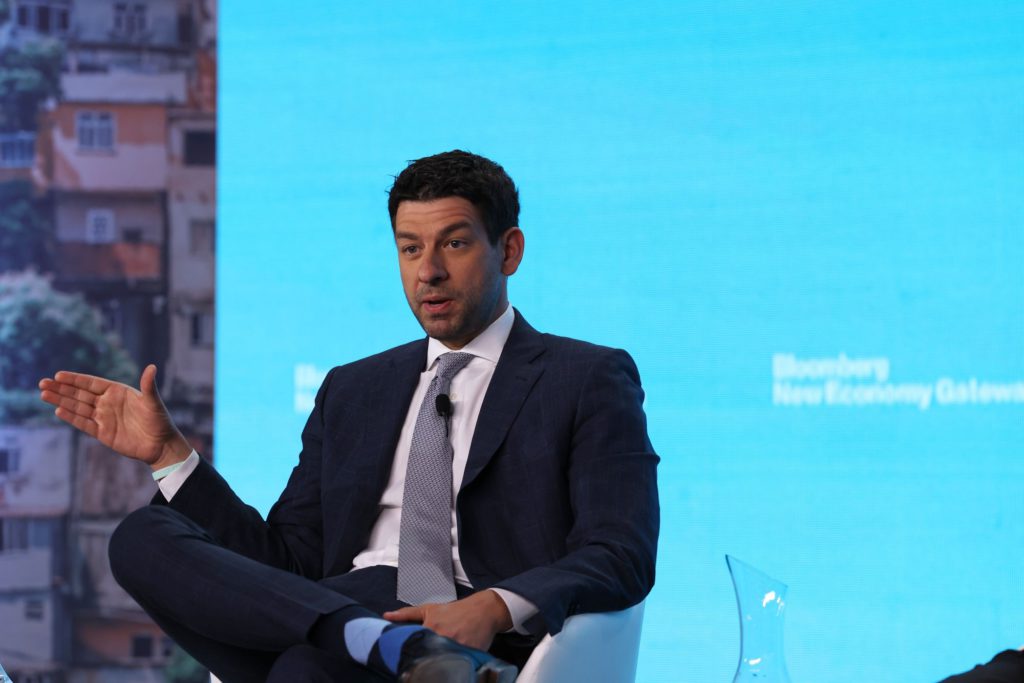(Bloomberg) — After being battered by the pandemic like few regions in the world, Latin America finally has some tailwinds at its back.
Soaring commodity prices are bolstering exports for many countries while the push by multinationals to shorten and fortify their supply chains is prompting many of them to consider building new factories in the region. There are plenty of risks still: unemployment remains high, poverty has surged, populations are demanding political change across the region and the Federal Reserve is draining cash from the global economy.
At Bloomberg’s inaugural New Economy Gateway Latin America event in Panama City, just a short ride from the century-old canal that transformed global trade, speakers are debating the post-pandemic growth outlook as well as the preparation work needed to confront the next public health crisis, the transition to green energy and the case for cryptocurrencies in the region, among other topics.
You can follow the agenda here and the event will be streamed on the terminal at LIVE GO and on the web.
Panama canal traffic, new container port (11:30)
The global shipping bottlenecks rattling industries and consumers in the pandemic era were plain to see for the politicians, economists and investors gathering for the event in Panama.
Separately, Notarc Management Group, a Latin America-focused investment firm, announced on the sidelines of the event that it’s partnering with a unit of Mediterranean Shipping Company to take over construction of the $1.4 billion Panama Canal Container Port.
Opportunities still abound in technology (11:25 a.m.)
Current down cycle and tighter liquidity in startup space in Latin America is temporary, Sumita Pandit, chief operating officer of dLocal said.
“Cycles are good, it helps you go through these ups and downs to actually strengthen your business model,” Pandit said. “There will be some companies that will not survive the capital constraint that will probably come in the next few quarters but I’m absolutely certain that the cycle will turn and we will again see the abundant availability of capital.”
Latin America technology industry is still missing more female-led companies and founders, according to Mate Pencz, founder and co-CEO of Loft.
Bachelet discusses Chile, human rights (10:50 a.m.)
UN High Commissioner for Human Rights Michelle Bachelet, speaking in an interview with Bloomberg’s Stephanie Flanders, threw her support behind Chile’s draft constitution, saying she would like to see it approved in September’s national referendum even as polls show growing rejection of the document among her fellow nationals.
“It’s offering a new social contract,” the former Chilean president said.
More broadly, she voiced concern about the short-term outlook for Latin America as policymakers battle the global wave of inflation sparked by the post-pandemic recovery and Russia’s invasion of Ukraine.
On defining Latin America’s alliances (10:25 a.m.)
A panel discussed where Latin America’s geopolitical allegiances should lie and whether nearshoring is really happening amid supply chain disruptions.
“Latin America should be as promiscuous as it can be to play every side for whatever it can,” Marko Papic, partner at Clocktower Group said. “Multipolarity is a great opportunity.”
Inter-American Development Bank head Mauricio Claver-Carone said the US remains the most reliable partner as the biggest foreign direct investor and the realignment of supply chains at the moment represents the biggest opportunity of a lifetime.
“The US has very few free trade agreements but the ones we have are in Latin America,” Shannon O’Neil, Vice President of the Council on Foreign Relations, said. “So companies here have preferred access to the largest economy in the world.”
Michael Bloomberg on role Latin America plays (9:38 a.m.)
Michael Bloomberg, founder of Bloomberg LP, said in a video message to kick off the event that Latin America has a “critical role” in helping confront some of the world’s biggest problems.
Latin America is an economic engine, fertile ground for entrepreneurship, is a global tradeway and is a critical part of our natural defense against climate change given its biodiversity.
More stories like this are available on bloomberg.com
©2022 Bloomberg L.P.











